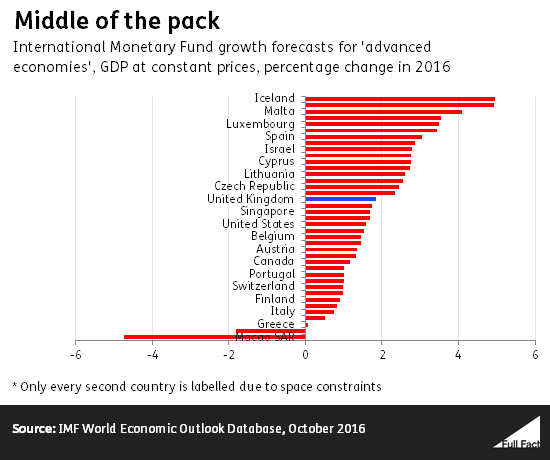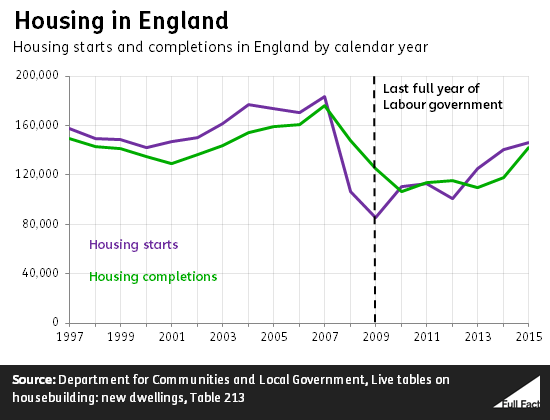Prime Minister's Questions, factchecked
Join 72,953 people who trust us to check the facts
Sign up to get weekly updates on politics, immigration, health and more.
Subscribe to weekly email newsletters from Full Fact for updates on politics, immigration, health and more. Our fact checks are free to read but not to produce, so you will also get occasional emails about fundraising and other ways you can help. You can unsubscribe at any time. For more information about how we use your data see our Privacy Policy.
“The IMF says that this will be the fastest-growing advanced economy in the world this year”
Theresa May, 30 November 2016
“Since she quotes the Institute of Fiscal Studies, I think she’s been a little bit selective, because they also went on to say that the prospect for workers over the next six years was ‘dreadful’ and went on say “the worst decade for living standards since the last war and probably since the 1920s”
Jeremy Corbyn, 30 November 2016
As the Prime Minister went on to point out, Mr Corbyn misheard or confused the source of her claim, which was the IMF rather than the IFS. But he was more accurate in quoting the latter than Mrs May was in quoting the former.
The International Monetary Fund publishes a closely watched set of economic forecasts, including a prediction of growth by country. It expects the UK economy to grow by 1.8% in 2016.
That’s a higher forecast than any of the other countries in the G7 group, which includes the likes of the US, Germany and Japan. But it’s nowhere near the highest among the 39 countries and territories that the IMF considers ‘advanced economies’. The UK sits 18th in this ranking.

Mr Corbyn responded by quoting the Director of the Institute for Fiscal Studies, Paul Johnson.
Mr Johnson said last week that according to official projections “real wages will, remarkably, still be below their 2008 levels in 2021. One cannot stress enough how dreadful that is—more than a decade without real earnings growth”.
He also told the BBC that “this has, for sure, been the worst decade for living standards certainly since the last war and probably since the 1920s".
To be clear, Mr Johnson is referring to the rate of growth in wages compared to growth in previous eras—not suggesting that wages are actually lower now than they were in the 1920s.
“House building starts fell by 45% under Labour, in 12 years, they have increased by over two thirds since the Conservatives were in government. ”
Theresa May, 30 November 2016
This is a claim that we’ve seen before. The figures are correct, although they reflect the impact of the financial crisis—and there are other ways to measure house building.
If you compare the number of houses started in England in the calendar year that Labour entered office in 1997 (158,000) with the number started in the last year it was in government in 2009 (86,000), that’s a decrease of 46%.
Comparing that with the houses started in 2015 (146,000) shows that housing starts have increased by 71%—which is actually a bit closer to three quarters than two thirds. Older house building estimates from when the government first made this claim supported a claim of two thirds only.
The crash in house building around the time of the change of government affects this picture hugely. For example, if you switch from looking at housing starts to looking at completions, house building under Labour fell by 16% whereas under the Coalition and Conservative governments it increased by 14%.
This is because of the lag time between beginning to build a house and finishing it. The full impact of the sharp decline in housing starts under Labour didn’t feed through into completions until the Conservatives were in power.

“The average cost of a child’s funeral today is £3,675. Some councils don’t charge anything, some do charge a lot, and the Social Fund is means tested.”
Chris Bryant MP, 30 November 2016
The average cost of a funeral in 2016 was indeed £3,675, according to research by pensions and insurance company Royal London. A rival insurer puts it at £3,897, but the Royal London figure is the one reproduced by the Money Advice Service, which is where Mr Bryant’s office sourced the figure.
The cost varies in different parts of the country, as well as depending on whether the family wants a burial or cremation and how elaborate the ceremony is.
It may also be lower in the case of a child. The Child Funeral Charity says that “many funeral directors, the clergy and most celebrants do not charge fees” for a child’s funeral. But “there are other funeral related expenses that bereaved parents struggle to find”.
These might include the burial fees charged by councils. As Mr Bryant says, some don’t charge for the burial of someone under 16. Others do, albeit that there is often a reduced fee in these circumstances.
A government Social Fund Funeral Payments scheme can help to pay for these and other funeral costs. Mr Bryant is correct that it’s means tested—only people who get certain benefits are eligible.
The average payment under this scheme in 2015/16 was around £1,400, according to the House of Commons Library, which says that “the adequacy of payments has long been a source of complaint”.
“The last Labour Government took 800,000 children out of poverty…”
Jeremy Corbyn, 30 November 2016
That’s correct by one reasonable measure. But there are many different measures of poverty.
Mr Corbyn is talking about the number of children in relative poverty, which fell by about 800,000 between 1997/98 and 2009/10, not taking housing costs into account.
It’s also reasonable to consider incomes when housing costs are included. By that measure, the number of children in relative poverty fell by less over the same period. It fell by about 300,000.
Households in relative poverty have an income that’s less than 60% of the middle-earning household—in other words, they’re poor relative to other households in the UK.
This can sometimes lead to counter-intuitive conclusions. For example, it would be a bit odd to say that a family was lifted out of poverty simply because other families on the street got poorer.
Another measure is absolute poverty, which the government defines as having an income less than 60% of the middle-earner in 2010/11.
By that measure, the number of children in poverty fell even more under New Labour.
About 2.7 million fewer children were living in absolute poverty by the end of the last Labour government, or 2.1 million fewer if you take housing costs into account.
“...Under her government child poverty is rising and now covers 4 million children across the country.”
Jeremy Corbyn, 30 November 2016
It’s also correct that the best estimate for the number of children in relative poverty has risen since 2010.
It’s not risen by enough to say, with confidence, that we’re seeing a real change in poverty rather than a chance variation in the estimate. On the other hand, the estimate has risen consistently each year.
It was down to 3.6 million in 2010. It now stands at 3.9 million.
“We are seeing fewer families in absolute poverty and fewer families in relative poverty.”
Theresa May, 30 November 2016
We’ve asked No. 10 which time period Mrs. May is referring to here.
If you look at the trends since the 2010 election, it’s wrong to say that the number of families living in relative poverty is falling.
The government’s best estimate for both the number of children and the number of individuals in relatively poor households increased between 2010/11 and 2014/15, whether you look at it before or after housing costs.
On the other hand, it’s true that the DWP’s best estimate for the number of people living in absolute poverty has fallen slightly since 2010/11, having peaked in 2012/13. Again, that’s the case whether you take housing costs into account or not.
The best estimate for the number of children in absolute poverty has remained broadly stable over the same time period.
Again, none of these changes are large enough to say for certain that we’re seeing a real change in poverty rather than a chance variation in the estimate. It gets easier to spot trends in the figures if you look at longer time periods, so we’ve looked at the long term trends in our poverty guide.